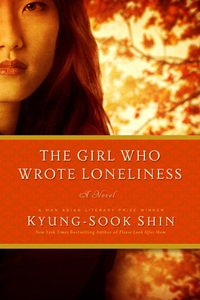Take a photo of a barcode or cover
The story and the characters are interesting and well written, but a few things kept me from rating the book higher. I'm not sure how to describe the writing style but it's very hard to read. It has a way of distancing the reader. I realize though that this could be the translation, not the original Korean. The politics also don't make a lot of sense to a naive reader. I understand why they're introduced so late in the book, because the protagonist herself is unaware of what is happening in the larger world, she only sees the sweatshop and anti-union activity of her employer. But for those of us outside of Korea (and perhaps some inside Korea as well, given that the story talks about how much of this was hidden from the general populace), who aren't familiar with the protests, the camps, the changes in government, some additional information would be very helpful (it could come from the adult parts of the book).
emotional
reflective
slow-paced
informative
reflective
sad
slow-paced
Plot or Character Driven:
Character
Strong character development:
Yes
Loveable characters:
Complicated
Flaws of characters a main focus:
Yes
reflective
medium-paced
Plot or Character Driven:
A mix
Strong character development:
N/A
Loveable characters:
N/A
Diverse cast of characters:
N/A
Flaws of characters a main focus:
N/A
This is not exactly memoir, but from all of my research I believe it is autofiction--though I have never found it called that.
This book is about the lives of those who were working in Seoul in the 1970s/80s as Korea rocketed into a technological/manufacturing world power. TVs, stereos, and other consumer goods were made in large factories, staffed by undereducated workers from the countryside, who struggled to find proper housing and to afford proper food. The main character seems to be based on herself.
This book is certainly interesting, covering some of the history of Korea's success that I certainly wasn't aware of--yet it also fits in well with the Korean/Korean American literature I have read over the last couple of year.
It is hard to read though--I listened, and it was not an easy listen. The main characters do not have names (cousin, eldest brother, third brother, etc)--only co-workers and teachers have names. It is also told nearly entirely in the first person present tense. The author also repeats phrases, over and over ("I, 16 years old"). I think this is to emphasize to the reader--and possibly to herself--just how young they all were.
Shin follows her protagonist for about 4 years--and then a later year. At the age of 16 she is sent from her rural village to Seoul with her 3-years-older female cousin. They are to live with her eldest brother and be factory girls. Eldest brother is trying to work and attend school, and then has to do his compulsory military service. It is about 1979. They all live in 1 room in a 37-room boarding house, with a shared bathroom and their own kerosene stove. The protagonist and her cousin work on a stereo assembly line. There is a union forming, and the protagonist is in over her head--she does not know what is going on. She just wants to be a writer. The union and factory agree to allow night school (high school) for a select number of students, and both girls get in. Soon her third brother joins them in their cramped room. Money is a struggle, they are constantly jockeying for more hours and cheaper food. The later year she in her early 30s, is a writer, and is clearly traumatized by how she lived ages 16-20, and the things she saw and experienced.
This book is about the lives of those who were working in Seoul in the 1970s/80s as Korea rocketed into a technological/manufacturing world power. TVs, stereos, and other consumer goods were made in large factories, staffed by undereducated workers from the countryside, who struggled to find proper housing and to afford proper food. The main character seems to be based on herself.
This book is certainly interesting, covering some of the history of Korea's success that I certainly wasn't aware of--yet it also fits in well with the Korean/Korean American literature I have read over the last couple of year.
It is hard to read though--I listened, and it was not an easy listen. The main characters do not have names (cousin, eldest brother, third brother, etc)--only co-workers and teachers have names. It is also told nearly entirely in the first person present tense. The author also repeats phrases, over and over ("I, 16 years old"). I think this is to emphasize to the reader--and possibly to herself--just how young they all were.
Shin follows her protagonist for about 4 years--and then a later year. At the age of 16 she is sent from her rural village to Seoul with her 3-years-older female cousin. They are to live with her eldest brother and be factory girls. Eldest brother is trying to work and attend school, and then has to do his compulsory military service. It is about 1979. They all live in 1 room in a 37-room boarding house, with a shared bathroom and their own kerosene stove. The protagonist and her cousin work on a stereo assembly line. There is a union forming, and the protagonist is in over her head--she does not know what is going on. She just wants to be a writer. The union and factory agree to allow night school (high school) for a select number of students, and both girls get in. Soon her third brother joins them in their cramped room. Money is a struggle, they are constantly jockeying for more hours and cheaper food. The later year she in her early 30s, is a writer, and is clearly traumatized by how she lived ages 16-20, and the things she saw and experienced.
I think this is a case of poor translation because I loved Please Look After Mother. But the writing style in this was insufferable.
This is a novel about a novelist writing about her own past. This opens an emotional well that she has hidden from herself for her entire professional life. As readers, we learn about her past through her writing, which reads like a flashback.
I love that this book is about writing to understand oneself. I really relate to the narrator asking herself why she writes what she does, as well as her questions over what she should omit and include in her written personal history.
In both the past and present, we watch the protagonist struggle with her sense of identity. In her adult writer life, she works to reconcile her current traumatized self and the actual events of the past.
Her flashback life takes place during a politically chaotic time in Korea. It's the 1970s. She's an assembly line factory worker and the work is dangerous, sometimes lethal. During this time, we watch her desperately try to make sense of herself, family, and her situation, but she remains perpetually confused, like most people of that age (she’s in her late teens).
In the present, as she unwinds her history, she exposes her wounds to us and gives us a glimpse into her fear, guilt, and eventual reconciliation with her past. There are a lot of time jumps, but I got used to them quickly. The suspense is in finding out exactly what she doesn’t want to remember and why she’d avoiding it.
I found the writing to be atmospheric and moody. Sometimes I loved it and sometimes I found it tedious. There are times when her flashback life is so horrific that it almost comes off as dystopian, even though it is from a real time in history. However, I found this a little bit uplifting. It demonstrates that we do get through rough political times like these, even if we find ourselves repeating them.
I love that this book is about writing to understand oneself. I really relate to the narrator asking herself why she writes what she does, as well as her questions over what she should omit and include in her written personal history.
In both the past and present, we watch the protagonist struggle with her sense of identity. In her adult writer life, she works to reconcile her current traumatized self and the actual events of the past.
Her flashback life takes place during a politically chaotic time in Korea. It's the 1970s. She's an assembly line factory worker and the work is dangerous, sometimes lethal. During this time, we watch her desperately try to make sense of herself, family, and her situation, but she remains perpetually confused, like most people of that age (she’s in her late teens).
In the present, as she unwinds her history, she exposes her wounds to us and gives us a glimpse into her fear, guilt, and eventual reconciliation with her past. There are a lot of time jumps, but I got used to them quickly. The suspense is in finding out exactly what she doesn’t want to remember and why she’d avoiding it.
I found the writing to be atmospheric and moody. Sometimes I loved it and sometimes I found it tedious. There are times when her flashback life is so horrific that it almost comes off as dystopian, even though it is from a real time in history. However, I found this a little bit uplifting. It demonstrates that we do get through rough political times like these, even if we find ourselves repeating them.
The Girl Who Wrote Loneliness is set in the 1970s during the industrial boom and is heavily autobiographical. It tells of a young teen who moves to Seoul to work in a factory. She’s homesick, lives in a one room apartment with two brothers and a cousin, unionism is discouraged at work and exploitation and bullying is rife. She lives on the edge of poverty and food is often scarce. All while attending night school to finish high school and hopefully qualify for university. There’s a dreamlike quality, a sort of detachment possibly caused by the dual timeline. The story is told from the 1990s when she is a successful author looking back at her turbulent time as a factory worker while also relating details of her current life. She doesn’t always recognise or connect with her former self. Valuable for highlighting some of the costs of economic advancement.
It's a beautifully written memoir, and I really wanted to like it... But I was bored.





